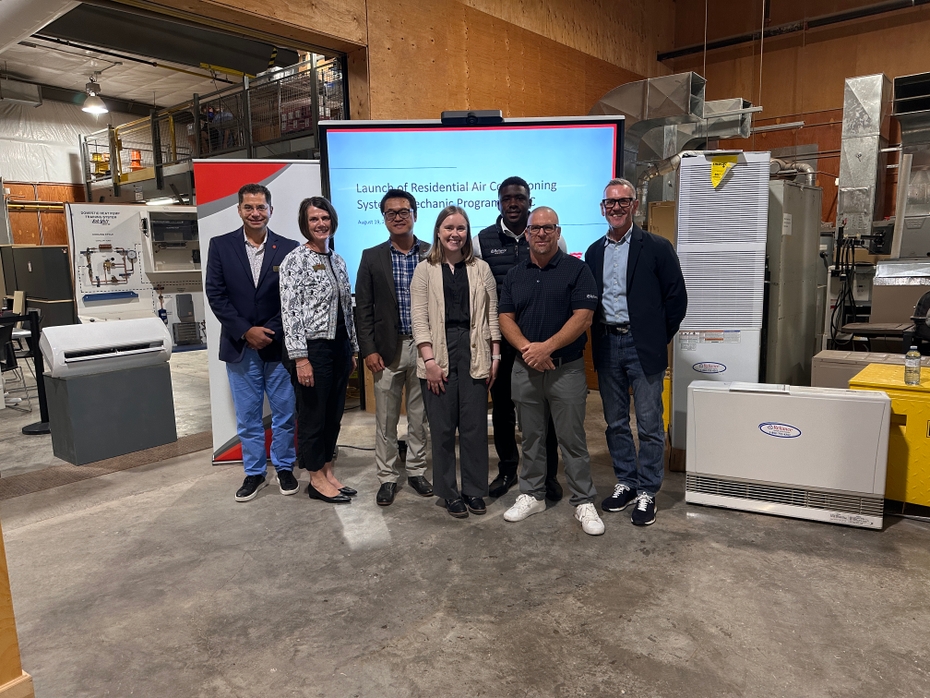Submitted by Daniel Liao, Dean, Applied Science, Technology and Trades
During a lunchtime reception on August 19, SLC celebrated the launch of its new Residential Air Conditioning Systems Mechanic program, which addresses a critical shortage in a skilled trade and meets the needs of both apprentices and employers.
Behind this exciting announcement is an amazing journey that led to this program being launched.
In January 2022, ClimateCare Canada approached SLC to discuss their training needs and to offer a partnership. Throughout many early meetings while we strategized how to create a program, Executive Director Victor Hyman helped me understand the issue at hand.
ClimateCare's HVAC apprentices, like many other apprentices of HVAC employers who work in the residential sector, need to access classroom training for 313D Residential Air Conditioning Systems Mechanic to become licensed journeyperson technicians.
Most trainers, college or otherwise, offer the shorter, 2-level, 313D alongside the 3-level, 313A Refrigeration and Air Conditioning Systems Mechanic program. With the latter geared towards commercial HVAC and refrigeration applications while sharing a common core with 313D, most trainers prioritize offering 313A over 313D. The result is apprentices gravitate towards the 313A program, spend a longer amount of time training to become HVAC journeypersons, and subsequently leave the residential sector.
This "brain drain" exacerbates the housing shortage, as homes are unable to be completed while the installation of AC and heat pumps are delayed due to a shortage of technicians. For trainers, it’s also a vicious cycle that leads to them offering more 313A classes because of the skewed lack of demand for 313D training.
All the while, residential HVAC apprentices are forced to compromise, either through challenging the exemption exams to graduate levels or relocate far from home for upwards of eight weeks at a time to take advantage of a rare offering of 313D classroom training by a trainer. As educators we know exemption exams are no substitute for in-class instruction, and as community colleges, we know how important it is to provide access to education to the local community.
We learned a lot during the COVID-19 pandemic on how to educate effectively in hybrid format, with theory delivered virtually, and labs are held in person. Lockdowns required us to condense labs into short, intensive time periods. With the success of hybrid learning, I wanted to maintain this delivery to provide access to training, especially for those living in rural areas or trades that are most affected by shortages.
Through the partnership with ClimateCare, SLC held consultations with their Training Committee and member companies to understand their challenges. It was determined that a hybrid 313D program that featured part-time, online instructions followed by an intensive period of in-person labs on campus would be an improvement over how their apprentices are currently being trained. This led to SLC designing a program that consists of 12 weeks of two hours/weekday of theory, followed by 40 hours/week of practical labs over three weeks.
SLC then sought approval from the Ministry of Labour, Immigration, Training and Skills Development to deliver it, which was received in 2023.
The main benefit to the employer is that their apprentices can continue working during the day while studying theory part-time in the evenings. It also leads to a shorter period of release (three weeks versus eight) for the apprentices when the intensive three-week period of labs begin.
The benefit for apprentices is that they continue to work, earn, learn and accumulate on-the-job apprenticeship hours during the theory portion, while the release and relocation (for those not from Kingston) for classroom training is minimized. For some apprentices with family responsibilities, three weeks versus eight weeks of release and/or relocation could mean the difference between completion of apprenticeship versus an indefinite delay of their training and a career switch away from the trade.
A little more than two years later, we have nine passionate HVAC apprentice learners in the intensive three weeks of labs who will soon complete their hybrid level 1 classroom training in our inaugural intake. Most have relocated from other regions of Ontario and have found comfortable and affordable accommodations in SLC’s residence for the three weeks. On their first day at Kingston campus, there was a buzz in the air as they excitedly met each other and their instructors face-to-face for the first time.
This journey and incredible outcome were possible because of the support of ClimateCare and the vision that Victor Hyman and I both shared, where barriers to training can be removed through innovative and flexible programming. As an academic leader, I have grown personally and professionally through this as it will forever serve as a great example of partnership success between an employer and educational institution.
